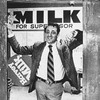I’m currently on my third straight day of being laid up with the flu. It hurts to walk and the idea of eating solid food makes me cringe, and also, I’m ever whinier than usual. On the positive side, though, in addition to watching innumerable hours of Star Trek, I’ve managed to squeeze in some excellent documentaries.
 Heima is a concert/tour film from the Iceland band, Sigur Rós. In 2006, the band, having successfully toured internationally, did an unannounced tour of Iceland, playing in everything from music festivals to coffee houses to abandoned factories in near-ghost-towns. The doc mixes concert footage with starkly beautiful photography and snippits of interviews. The interviews don’t do much to dispel the band’s reputation for being aloof and prickly, but the music (all recorded live) is brilliant and… my god, watch this trailer and tell me you don’t want to go to Iceland.
Heima is a concert/tour film from the Iceland band, Sigur Rós. In 2006, the band, having successfully toured internationally, did an unannounced tour of Iceland, playing in everything from music festivals to coffee houses to abandoned factories in near-ghost-towns. The doc mixes concert footage with starkly beautiful photography and snippits of interviews. The interviews don’t do much to dispel the band’s reputation for being aloof and prickly, but the music (all recorded live) is brilliant and… my god, watch this trailer and tell me you don’t want to go to Iceland.
Actually, I saw this one the night before I came down with the flu, at the VIFC, and there was an interesting Q & A with the director, who explained the genesis of the film in a failed tour documentary that he volunteered to try to salvage. This explains some of the rough edges the film has (and, apparently, a lot of the landscape photography), but really, kudos to Dean DeBlois for taking what apparently was an unwatchable mess and making it into a really striking film.
 The King of Kong is a different genre altogether — the crowd-pleasing, unabashedly dorky subculture doc (see also, Spellbound, Trekkies, Wordplay, etc.). It’s basically the story of a likeable loser and an obnoxious winner, and their not-so-friendly rivalry for the World Record score for Donkey Kong, a record that is almost literally a matter of life and death to them, and almost completely irrelevant to every other human being on the planet. I’m not sure it’s quite worth some of the rave reviews its been getting, but it is terrifically entertaining. (And after you see it, check out this fascinating interview with the film’s “villain”, Billy Mitchell, in which he comes across as even more self-absorbed but also more likeable than he does in the movie.)
The King of Kong is a different genre altogether — the crowd-pleasing, unabashedly dorky subculture doc (see also, Spellbound, Trekkies, Wordplay, etc.). It’s basically the story of a likeable loser and an obnoxious winner, and their not-so-friendly rivalry for the World Record score for Donkey Kong, a record that is almost literally a matter of life and death to them, and almost completely irrelevant to every other human being on the planet. I’m not sure it’s quite worth some of the rave reviews its been getting, but it is terrifically entertaining. (And after you see it, check out this fascinating interview with the film’s “villain”, Billy Mitchell, in which he comes across as even more self-absorbed but also more likeable than he does in the movie.)
 Being entertaining, though, is something that doesn’t even enter the picture in The Times of Harvey Milk, about the rise and assassination of one of America’s first openly gay politicians. It’s sombre and powerful, but like a lot of sombre, powerful docs, it’s kind of manipulative: Harvey Milk, a moderately competent local politician killed by a mentally ill man, is presented as a martyr for gay rights, and frankly I didn’t buy it. It’s unfortunate that they didn’t just let Milk’s life speak for itself, and let us see him as a decent man who was the victim of a senseless tragedy.
Being entertaining, though, is something that doesn’t even enter the picture in The Times of Harvey Milk, about the rise and assassination of one of America’s first openly gay politicians. It’s sombre and powerful, but like a lot of sombre, powerful docs, it’s kind of manipulative: Harvey Milk, a moderately competent local politician killed by a mentally ill man, is presented as a martyr for gay rights, and frankly I didn’t buy it. It’s unfortunate that they didn’t just let Milk’s life speak for itself, and let us see him as a decent man who was the victim of a senseless tragedy.